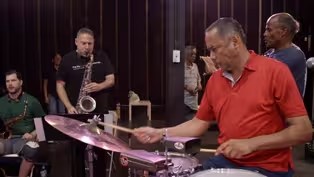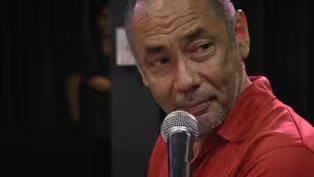
Meet the Band
Clip: Season 2024 Episode 3 | 12m 17sVideo has Closed Captions
Meet the members of the Mambo Legends Orchestra.
Meet the members of the Mambo Legends Orchestra including Mitch Frohman and Carmen Laboy. The band provides a link to the golden era when the Machito Orchestra fused the big-band sound of popular music with the rhythms of Africa, Cuba, and Puerto Rico to create an enduring musical genre beloved around the world.
Problems playing video? | Closed Captioning Feedback
Problems playing video? | Closed Captioning Feedback

Meet the Band
Clip: Season 2024 Episode 3 | 12m 17sVideo has Closed Captions
Meet the members of the Mambo Legends Orchestra including Mitch Frohman and Carmen Laboy. The band provides a link to the golden era when the Machito Orchestra fused the big-band sound of popular music with the rhythms of Africa, Cuba, and Puerto Rico to create an enduring musical genre beloved around the world.
Problems playing video? | Closed Captioning Feedback
How to Watch VOCES
VOCES is available to stream on pbs.org and the free PBS App, available on iPhone, Apple TV, Android TV, Android smartphones, Amazon Fire TV, Amazon Fire Tablet, Roku, Samsung Smart TV, and Vizio.
Buy Now
Providing Support for PBS.org
Learn Moreabout PBS online sponsorshipJOSE: One two three four.
(mambo music playing).
♪ Coco seco.
Seco, seco.
(vocalizing) Hey!
Who's, who's coming heavy now?
You said?
MEMBER: You!
JOSE: Ok.
Thank you, ladies and gentlemen.
JOHNNY: That's it.
That's it.
JOSE: You all know what you are.
MITCH: No black pants.
No black jeans, no black sneakers.
Black suit and white shirt, a bow tie or tuxedo.
When I was little, I think my parents had an accordion in the house.
I'm from Pelham Parkway in the Bronx.
My family's Jewish.
I joke, they're almost like the Jewish Jeffersons.
My father grew up on Tremont and Anthony, between Webster and Grand Concourse.
My mother grew up on Morris Avenue.
When they got married, they moved on up to Pelham Parkway, where they raised me and my sister.
And then, when we graduated college, they moved on up to Riverdale, where they still live.
When I graduated college, I got a job in the Catskill Mountains.
It was in a basically Jewish hotel called Zucker's Lodge.
To my benefit, we finished early, before midnight.
Down the road at the Pines Hotel was the great Joe Cuba.
For some reason, Joe Cuba let me sit in with him.
And that was the first experience that I had playing real Latin music.
And then, when I got back home after the summer to New York, I started to investigate where some of the opportunities were.
Where the rhythm section and the vocals, of course, were predominantly Hispanic, the horn sections were mixed.
Because, you know, these guys were great musicians.
Tito Puente and all the others, they just cared if you can play.
(mambo music playing).
♪ MEMBER: Qué sabroso.
(vocalizing) MEMBER: Qué sabroso.
(vocalizing) MEMBER: Qué sabroso.
(vocalizing) MEMBER: Qué sabroso.
(vocalizing) MEMBER: Qué sabroso.
(vocalizing) MEMBER: Qué sabroso.
(vocalizing) MEMBER: Qué sabroso.
(vocalizing) MEMBER: Qué sabroso.
(vocalizing) ♪ (song ends) CARMEN: You want to say something, huh?
You also want to get into this conversation.
I know, Cookie.
Yes, you talk a lot.
How come you cannot say the stuff that you usually say?
This is a great picture.
This picture that you see here, we're all saxophone players here, but the gentleman that you see right above me is great arranger, also plays saxophone for many, many years with Tito Rodriguez, with Machito, with Puente, and that's Ray Santos over there, some great saxophone players.
But this picture with Madera and Eddie Montalvo, which is the congero with, uh, is playing tonight with us.
He's a two-time Grammy winner, and also he has his own band.
I play with Eddie.
And Louis Bauzó to the far right.
And, of course over here, we got the great Mario Grillo is, the son of Machito, and that's Tito Rodriguez Jr.
The son of Tito Rodriguez and myself.
I think this was a gig that we did in Burghausen in Germany.
To the right this is Pete Miranda, baritone player great saxophone player, and to the left is Al Acosta, another great saxophone player, and all-around woodwind player.
These cats have always also played with Tito Puente, with Tito Rodriguez, and with the Machito Orchestra.
And Pete was the actual person solely responsible for me to get my big break in New York in music.
So, actually, one of the first gigs that Pete sent me to cover for him was with Mario, with the Machito Orchestra.
And it was so funny because, at the end of the gig, Mario calls Pete and Mario tells Pete, "Hey, anybody, anytime that you cannot do the gig, please send her.
Not only can she play her ass off, but she has better legs than you."
Not that he ever saw them because I never wore a dress.
So, I always wear a suit also.
So if I can see it before...
Anyway, and this picture over here was the first time that I sat in with Tito Puente, and Jose was the musical director for Tito.
And Jose asked me, do you want to get to play to sit in with the band today because we're not having the baritone?
I said, oh, okay, sit down with Tito Puente.
Wow, that was great.
And about maybe an hour before we start playing, he said to me, "Oh, one thing I got to tell you.
Better make sure that Tito doesn't look back at you once because then you're dead.
That's it, you're done.
If he look once back at you."
He knew the music back and forth, everything, every note, everything.
And I said, "Gee, thank you for telling me this now an hour before."
But anyway, first number that I sat in that day was "Ran Kan Kan," and oh, good enough, I knew the number, so I was familiar.
And the whole night, it was great because he never looked back at me, not once, never.
HOST: Ladies and gentlemen, here's probably one of the most frantic things that Tito Puente and his group does, thing called "Ran Kan Kan." (mambo music playing] ♪ ♪ Rana, sagüero y rumba, araña peludi-ta ♪ ♪ Rana, sagüero y rumba, araña peludi-ta ♪ ♪ ¡Eeeh!
CARMEN: I started piano and solfeggio at the age of nine, born and raised in Ponce, Puerto Rico.
Uh, very proud of that.
I went to Escuela Libre de Música in Ponce.
No, I don't come from a family of musicians, but my parents were actually music lovers.
They always supported that.
And my father, the only thing, although I started playing professionally at 16, the only thing that he wanted me to do is just to keep my grades.
I had straight As in school and he said, "Just keep your grades, that's it.
And make sure that I get to know everybody that you're playing with.
So, if you're gonna have a gig, they have to come and pick you up here.
I'm going to get to know them.
I need to know their band leader.
I need to know everybody."
That's the old school.
That's the way I was brought up.
There have been women in Machito.
He had a trumpet player, a female trumpet player, but we're talking about years ago, um, don't actually know her name.
So, there have been women.
With Tito, never.
I was just fortunate to sat with him.
And of course, Tito Rodriguez Jr., yes, um, I played with him, and, um, but I'm not sure if Tito Rodriguez father had a woman in the band.
I don't think so.
But to me, it's very, very important just to get to know that a lot of these guys that I'm seeing tonight and that I often see when I play with different bands, they actually have a great sense of respect for what I do.
And they treat me not like a woman who plays an instrument but they treat me like a musician, which is what you want at the end.
(instruments warming up) JOSE: Okay, everybody know where we are?
One.
One two three four.
♪ ♪ (overlapping chatter).
CARMEN: I have a Selmer Mark VI baritone sax, 107000 series, 1959, and my actual fixture is an old New York Myers mouthpiece.
Let's do this.
It's a shame that they don't make them anymore.
(vocalizing in Spanish) (vocalizing in Spanish) (vocalizing in Spanish) ♪ Ahora sí, ahora no.
(vocalizing in Spanish) JOE: You would hear Machito play, and everybody would go ballistic.
Tito Rodriguez would come on, and you forgot what Machito played.
Then Puente would come on, and you forgot what the both of them played.
It was a constant battle.
JOHNNY: When I first started playing with Tito, I was talking about 1963, the Palladium we're talking about.
This is the time where there's competition going on.
This is the time where, "Who's going to look the sharpest, who's going to play the best?"
You know, it was, it was a whole different thing, but it was, I mean, it was a great experience playing with those bands to be able to see the other percussionists who we grew up idolizing from records and stuff.
As a kid, I'm telling you, my father had these great records.
I used to hear Machitos band.
So now I'm in the Palladium, and now I'm seeing Jose Mangual play in front of me.
It was like, "Ah!"
You know?
Behind the Scenes with the Band
Video has Closed Captions
Clip: S2024 Ep3 | 6m 57s | Go behind the scenes with the Mambo Legends Orchestra. (6m 57s)
Introducing the Mambo Legends Orchestra
Video has Closed Captions
Clip: S2024 Ep3 | 6m 45s | Meet the Mambo Legends Orchestra, comprised of former members of the Tito Puente Orchestra. (6m 45s)
Providing Support for PBS.org
Learn Moreabout PBS online sponsorshipSupport for PBS provided by:

















